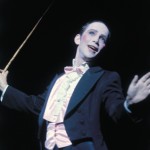In 1929, novelist Christopher Isherwood took a spring trip to Berlin and was so taken with the city that he moved there six months later. For the next four years, as Hitler rose to power, he kept a diary chronicling his life in the changing city. These entries provided the material for his 1939 short story collection, Goodbye to Berlin, which playwright John Van Druten adapted as I Am a Camera. In 1963, producer David Black commissioned composer Sandy Wilson to musicalize the play. Wilson had finished the book and most of the score when Black’s option on the material expired.
Producer Harold Prince picked up the option and hired Joe Masteroff to work on the book. He agreed to hear Wilson’s score but thought the music didn’t think suit what he had in mind, which was something more evocative of Kurt Weill, so he hired John Kander and Fred Ebb to create a new score.
As the team developed the show, Prince recalled his time in Germany after the war, particularly the Stuttgart nightclub Maxim’s, which employed “a dwarf MC, hair parted in the middle and lacquered down with brilliantine, his mouth made into a bright red cupid’s bow.” That figure became the show’s Master of Ceremonies, and Maxim’s became the show’s Kit Kat Club, where writer Cliff Bradshaw’s roommate Sally Bowles performs. The new focus led to a new title: Cabaret.
Just as the initial moments of Oklahoma! had defied audience expectations almost 25 years earlier, so did those of Cabaret when it opened on Broadway in 1966 with Bert Convy (Cliff), Jill Haworth (Sally), and Joel Grey (Master of Ceremonies). There was no curtain, just an empty stage with a large mirror hanging from above, reflecting the audience as they entered. There also was no overture, just a drumroll and cymbal crash leading into the opening number. Despite the initial shock, the musical won over its audiences. The production garnered 11 Tony Award nominations, winning eight (including best musical), and closed three years later, after 1,165 performances (the third longest-running musical at the time).
Director Harold Prince and choreographer Ron Field recreated their work for the show’s London debut in 1968 with Kevin Colson (Cliff), Judi Dench (Sally), and Barry Dennen (Master of Ceremonies), but the musical is best known through its 1972 film adaptation, written by Jay Allen and directed by Bob Fosse, starring Michael York, Liza Minnelli, and Joel Grey.
The film is quite different from the stage musical, not the least being the change in nationalities of Cliff and Sally (American and English, respectively, onstage) to Brian and Sally (English and American, respectively, onscreen). Most significant, though, was the elimination of all the “book songs.” (Before the stage show’s Boston tryout, Jerome Robbins has suggested the songs outside the cabaret be eliminated.) Kander and Ebb replaced several numbers and added others for the film. Replacements included “Mein Herr” (for “Don’t Tell Mama”) and “Money, Money” (for “The Money Song”). One addition was “Maybe This Time,” written in 1964 for Kaye Ballard. All three were incorporated into later stage productions.
Fosse also asked Hugh Wheeler, a friend of Isherwood’s, to revise Allen’s screenplay to ensure it was faithful to the original stories. Wheeler restored the subplot about the gigolo and Jewish heiress and made Brian bisexual instead of heterosexual (as Cliff is in the stage musical). The film was nominated for 10 Oscars, winning eight, and was inducted into the Library of Congress National Film Registry in 1995.
There was a short-lived Broadway revival in 1987, with Gregg Edelman, Alyson Reed, and Joel Grey, directed by Prince, but the most significant remounting was the 1993 London revival that Sam Mendes directed, starring Adam Godley, Jane Horrocks, and Alan Cumming. It differed substantially from the original stage production — a sparer, sexier, environmental production. (The audience sat at cabaret tables and could order drinks.)
The 1998 Broadway revival based on this production starred John Benjamin Hickey, Natasha Richardson, and Cumming. It was nominated for 10 Tony Awards, winning best revival of a musical among its four trophies, and ran for 2,377 performances. In 2014, this version was brought back for a short-lived Broadway revival, again directed by Mendes, with Bill Heck, Michelle Williams, and Cumming.
The original 1966 cast album won the Grammy as Best Score from an Original Cast Show Album and spent 39 weeks on the Billboard charts, peaking at #37. The 1972 movie soundtrack spent 72 weeks on the Billboard charts, peaking at #25, and was inducted into the Grammy Hall of Fame in 2008.
Listen to the soundtrack and read The Making of Cabaret (1999) by Keith Garebian for more about the show’s creation.
NEXT, for another tale of struggling artists living in challenging times, listen to Rent, with book and score by Jonathan Larson.
THEN, explore Urinetown, by Greg Kotis (book and lyrics) and Mark Hollmann (lyrics and music), which Kotis had the idea for while on vacation in Europe — and encountering pay toilets for the first time.

